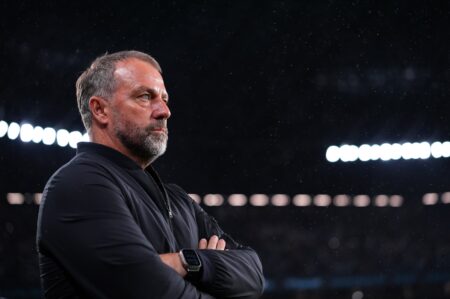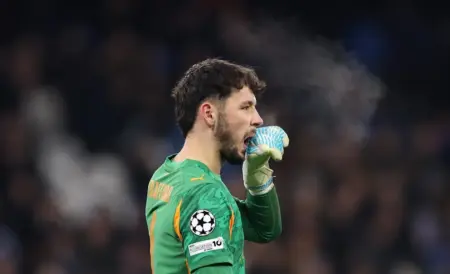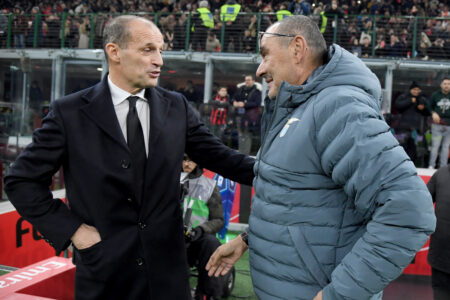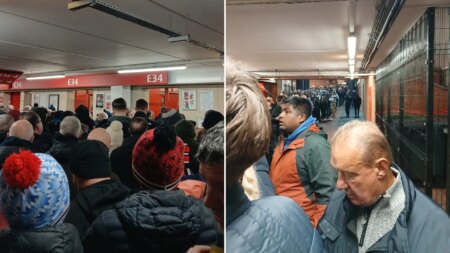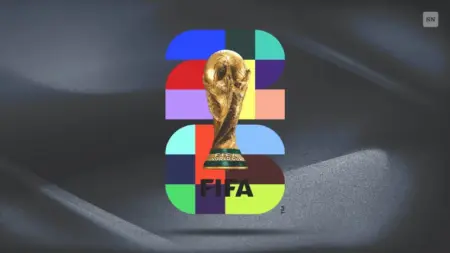The Controversial Finale
In a Champions League encounter that will likely long be remembered for its contentious closing moments, Club Brugge secured a 2-1 victory over Atalanta in the first leg of their play-off round clash, thanks to a highly disputed penalty awarded in the 94th minute. The drama unfolded as Gustaf Nilsson, the Club Brugge striker, chased down a loose ball inside the Atalanta penalty area. Isak Hien, an Atalanta defender and Nilsson’s Swedish compatriot, managed to get to the ball first and, in the process, held Nilsson off. What transpired next left many viewers and players alike in disbelief: Nilsson went down theatrically, clutching his face as if in severe pain, despite minimal contact. Turkish referee Halil Meler, without hesitation, pointed to the spot, awarding the penalty. Surprisingly, the VAR (Video Assistant Referee) did not intervene to overturn the decision, which only added to the furor.
A Storm of Protests
The immediate reaction from Atalanta’s players and staff was one of intense frustration and fury. Rafael Toloi, along with former Chelsea midfielder Juan Cuadrado and the accused defender Hien, surrounded the referee, demanding an explanation and protesting the call adamantly. The situation escalated to the point where Meler had no choice but to issue yellow cards to all three players, further intensifying the tension on the pitch. The fans, who had been watching the match with bated breath, erupted in outrage, vocalizing their disapproval through various social media platforms. The backlash was swift and unequivocal, with fans labeling the decision as one of the worst they had witnessed in the current season.
The Emotional Response
The penalty was taken by Nilsson himself, who maintained his composure despite the chaotic surroundings and successfully converted the spot-kick, securing Club Brugge’s victory. The goal sent Atalanta’s manager, Gian Piero Gasperini, into a fit of rage, storming down the tunnel and dramatically ripping his coat off as the ball hit the back of the net. Gasperini’s reaction was a vivid display of the sheer frustration and disbelief that permeated the Atalanta camp. For a team that had fought hard throughout the match, this final blow was particularly painful, coming at a time when they believed they had secured a pivotal away goal.
Referee Halil Meler: A History of Controversy
Halil Meler, the referee at the center of this storm, is no stranger to controversy. Just over a year ago, he found himself in a highly publicized incident where he was punched by Ankaragucu’s club president, Faruk Koca, at the end of a game. This history of being involved in contentious situations adds another layer of complexity to the current situation. Meler’s decision to award the penalty, and the VAR’s failure to review it, raises questions about the consistency and accuracy of refereeing in top-level football. Fans and commentators alike are calling for a thorough review of the incident to ensure fair play and the integrity of the game are maintained.
Fan Reactions and Social Media Outrage
The decision quickly became a focal point of discussion among football fans worldwide. Social media platforms were flooded with reactions, from incredulous disbelief to outright anger. One fan commented, "Might be the worst decision I’ve seen all season," encapsulating the widespread sentiment. Another added, "Disgraceful decision," while a third wrote, "Worst penalty decision ever. Absolutely embarrassing." The collective outrage highlights the deep impact that such a high-stakes mistake can have on the perception of the match and the competition as a whole. Fans are not just disappointed; they are demanding accountability and a reassessment of the refereeing standards in the Champions League.
The Broader Implications
This incident has reignited debates about the role of technology in football and the effectiveness of VAR in mitigating human errors. The VAR system, designed to assist referees in making accurate calls, seems to have fallen short in this crucial moment. The lack of intervention raises questions about the training, guidelines, and implementation of VAR. Moreover, the incident underscores the need for better communication and transparency between the match officials and the teams, as well as a more robust system for handling protests and ensuring fair play. As Atalanta prepares for the second leg in Italy, the shadow of this controversial decision looms large, potentially influencing the team’s morale and strategy. The football community now waits with anticipation, hoping for a fair and just resolution in the upcoming match.


